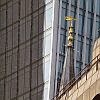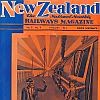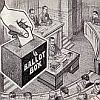I wrote the following essay on John Key and the politics of amnesia three years ago, in the lead-up to the last election.
In preparation for writing it, I attempted to read, watch or listen to every one of Key’s speeches as a politician, and several of his press conferences and interviews as Prime Minister. This was both excessive and pointless, for a peculiar and well-known characteristic of a modern politician’s public output is that it is largely devoid of content. It is a sort of pure rhetoric designed to resemble communication but conveying only affect: in Key’s case, a bland, reassuring air of competence and trustworthiness. The charm of a charmless man.
One of the aspects of the construction of Key’s character I explored is connected to the practice of deleting the digital archive of a politician’s speeches and announcements the moment that he or she becomes leader. This is not unique to John Key or to the National Party – I
about how David Shearer was erased from the Labour’s website within hours of resigning the leadership – but Key’s transformation was the most thorough I have witnessed. I believe in fact that one of the most convincing clues that Nicky Hager’s theory about the Dirty Politics project is correct is that Key never played the ‘nice’ politician before becoming leader. On the contrary he was, as I have documented, unapologetically nasty – a streak that has come to the fore again in the past weeks and days.
My essay was about rhetoric and didn’t contain any of the revelations that are absorbing us today. In almost all respects, it’s of no topical interest whatsoever. But I believe its underlying argument is still valid, and that the politics of amnesia will continue to be relevant even as Key’s career comes to an end – whether in the next three weeks or the next three years.
So I could have updated the essay but I thought it would be more interesting not to and here it is.
 |
| Lancaster Park, 1981 (via) |
At the time of
the Springbok Tour of 1981 John Key was in his last year of his Bachelor of Commerce degree at Canterbury University, yet if you ask him now whether he was pro or against the tour, he will reply that
he doesn’t remember. Of course nobody believes that, reasoning that even a fence-sitter – of which there must have been some – would recall taking that particular stance in one of the defining moments in the country’s social and political history, all the more so if he was attending university at the time. Therefore it has been widely assumed that this is a calculated lie, regarded by Key and his advisors as preferable to stating what his position was at the time and risk alienating a sector of the electorate.
Of the two options, I think the possibility that the Prime Minister may wish to hide having been
anti tour is the more chilling, but the speculation distracts us from the larger and more significant issue of why Key would want to dissemble at all. Why is the erasure of this personal political past, of the very idea that he might have been political at all as a young man, matter so much to his image?
The subtitle of
Nicky Hager’s important book on the 2005 election,
at the time when Key was Don Brash’s deputy, is ‘a study in the
politics of deception’. Since Key has taken over the Tory leadership, he
has steered the party into a new phase that would be best described as
‘the politics of amnesia’.
It is tempting to read
The Hollow Men as the prologue to the term as opposition leader and then the Prime Ministership of John Key. Hager suggests as much in the book’s epilogue, when he reminds us that one of the party’s principal financiers, businessman Rod Deane, had drawn from his conversation with Key the reassurance that the party under Brash and Key would resume the aggressive pursuit of radical economic reform from which the Tories had strayed for far too long [1]. Alister Barry’s
film adaptation of the book, which premiered four months before the 2008 election, wryly notes that no sooner had Key declared that he would break from the campaign style and the manipulation engaged in by his predecessor that he travelled to Australia to renew the commission of consultants Crosby/Textor. The strong implication here is that we should distrust Key’s professed centrism, and be mindful of how long Brash had succeeded in projecting a moderate, compassionate image while privately reassuring his backers that once in power he would be anything but a moderate. However while Hager’s book was so instrumental in revealing Brash’s true politics – the politics that he’s now pursuing in a much more transparent fashion as leader of ACT – it has failed to taint Key by association, no matter how substantive and prominent that association was.
This alone tells us that Key was very successful at making a decisive break with his documented past following the leadership coup. And so while there are commentators who contend that he has a ‘heart of darkness’ (
Sue Bradford) or that he is no more a moderate than his predecessor (
Gordon Campbell), there are others for whom he is a genuine centrist intent on reorienting the party towards small ‘n’ national politics (Colin James [2]), or who maintain that he has no secret agenda simply because he has no agenda at all (
Brian Easton). Granted, you could argue that the politics of these commentators is in turn fairly well-documented, and rather predictive of the above results, but that just means that the evidence is not yet clear enough to prove persuasive outside of partisan lines and across discursive domains.
To trace the politics of amnesia at work, we may begin looking at Key’s website,
johnkey.co.nz, and find it includes an archive of 142 speeches at the time of writing, beginning with
the first one he delivered as leader of the party and none from the previous tenure as deputy or from his time as a backbencher. In that first speech, Key proposed a vision for the party that was strongly linked to his personal story:
You may know that before entering politics I had a career in international finance. That career was sufficiently successful that from time to time the media likes to question me about what I might be “worth”.
Such questions imply that in the totality of my life, my investments are the most important assets I have accrued. How wrong that is.
As a husband and father, the things I value most in life are not anything you'll see listed on the Stock Exchange.
I think all New Zealanders would agree that the security, happiness and welfare of their family, which is also dependent on the security and welfare of their community and country, is the most precious thing to them.
This vision, which would be more fully articulated in the
‘Kiwi way’ speech delivered two months later at the Burnside Rugby Clubrooms in Christchurch (the location that replaced
Brash’s Orewa), included the following commitment:
I have said before that I believe in the welfare state and that I will never turn my back on it.
This is how Key in early 2007 heavily qualified his critique of a system that sometimes trapped its beneficiaries instead of helping them (the highly corrosive but always effective phrase ‘welfare dependency’). Now not only could one counter that, when he was Brash’s deputy, Key regularly trotted out the accusation that Labour was ‘soft on welfare’, but in 2002, having just entered Parliament, he was immediately counted amongst the party’s hardliners, stating for the record his belief that there were women on the DPB who,
for want of a better term, [have been] breeding for a business.[3]
Resetting the political clock at the time when he assumed the leadership has helped Key to inoculate himself – to use the phrase so dear to Brash’s strategy team – with regard to the area that has been and will continue to be
the crucial battleground of his Prime Ministership, and
a key indicator of a politician's neoliberal quotient.
We may regard with equal suspicion his very strong protestations that no John Key-led government would include Roger Douglas as a Minister
We are going to do the best things for New Zealanders, but we’re not going to be held hostage running a radical right-wing agenda. It’s not why I came into politics, it’s not what I’m campaigning for, it’s not what I stand for, and I’ll be buggered if I’m going to go out there and run a policy agenda which is moderate, considerate and pragmatic, and then turn around and try to sell New Zealanders down the river. [4]
against his links to the cynical politicking of his former leader and his willingness to promise Brash a cabinet position should National win the next election and ACT be returned to Parliament. Clearly the issue here is that Roger Douglas is associated in the minds of the electorate with the decade of New Right reforms in New Zealand in a way that Don Brash isn’t – possibly because of the latter’s administrative/technical as opposed to political role – and the association is still considered toxic. Hence Key’s insistence that he is not interested in ideology, but in what works, and that ‘the National Party is about tomorrow, and what we can achieve’, and not about ‘blaming things from twenty years ago’ [5]. And so too perhaps his refusal to answer the less charged question of where he stood on the Springbok Tour is motivated by the fear of being drawn into a discussion of that decade and what was to follow.
The problem of the politics of amnesia, it must be clear, is larger than John Key, and reflects a complicated and ambiguous relationship with neoliberal reforms in the country as a whole, a failure to properly engage with the political issues that remain open, wound-like. On this count I think the conventional wisdom used to explain the rise of John Key and National’s easy road to victory in 2008 ought to be reversed: the issue is not that people got tired of Labour, but rather that Labour’s narrative itself was exhausted. Just how exhausted was highlighted in the campaign when Annette King criticised National’s youth policies as if she was a member of the opposition and not in charge of that very portfolio, and when put on the defensive blamed a raft of social statistics on the benefit cuts under Ruth Richardson, fifteen years earlier [6]. This kind of profoundly disconnected statement only served to confirm that Labour had never really meant to reverse or rethink the fundamental planks of Rogernomics. After three terms, it was clear that the party’s policies couldn’t match the rhetoric of change that had framed its 1999 election victory.
Clark’s metaphor of the New Zealand economy as a cork bobbing in the ocean, later mirrored by Key’s mantra that we can’t stand on the beach and push back the tide of the global recession, had become shorthand for the much larger and far less justifiable claim that there is no big ‘p’ politics, just good or bad administration, and therefore the supreme virtue of a politician is competence – which Clark possessed in abundance – as opposed to the capacity to produce meaningful and lasting change. But the voters hadn’t forgotten (and Māori voters especially so) that Labour had promised them something else.
(The politics of amnesia came even more starkly to the fore in the disastrous election of Phil Goff as Labour leader after the election. Whatever Goff’s merits and skills, whatever his seniority, that decision meant that Labour would have
the worst possible person in charge of breaking the neoliberal consensus, should they have opted to do so – a person who had been implicated with, and had never apologised for, the very reforms that Key is supposedly conspiring to relaunch behind the nation’s back.)
Key and his strategy team read the situation very well, and made sure they would project competence as well as making the claim that the party’s policies were forward-looking – under the ‘ambitious for New Zealand’ slogan – for the benefit not of the politicised voter but rather of the soft, disengaged centre, in the well-founded hope that it might itself be forgetful enough to buy this claim. As late as 2010, two years into his first term, it was perhaps these citizens that Key was addressing when, in wishing them Merry Christmas in a
recorded message for Radio New Zealand, he introduced himself as follows:
Hallo, it's John Key, the Prime Minister of New Zealand.
There he is, in a nutshell: a man who sees himself as the Prime Minister of the people who may not be quite sure who the Prime Minister is, or in which country they live.
***
The question of whether Key has steered National in a moderate liberal direction or is gunning for a second round of radical economic reform over the next three years can properly be answered not by listening to the speeches and the prepared statements but by keeping a close eye on the workings of government and of the party machine. It is the work of political reporters, investigative journalists, unions, advocacy groups and anybody in a position to tell when there is a mismatch between rhetoric and substance in one or more of the government’s policies, or to spot a contradictory connection. When Bruce Jesson complained that New Zealand is a hollow society, I think he might have meant that we don’t have too many people on this kind of case, and that they’re easily isolated and neutralised.
I say that there is not much to be gained by studying John Key’s speeches, but I did it anyway. Over the course of the last few weeks I endeavoured to either listen to or read everything that Key has said into a microphone since becoming an MP and that is available for consumption, as well as a lot of what has been said and written about him. Other than the fact that I might have watched
Citizen Kane a couple of times too many, I’m not sure what I was hoping to demonstrate by doing that: I can certainly say that I don’t feel especially enlightened about John Key the man or John Key the politician, and that I didn’t glimpse a grand design, sinister or otherwise. His celebrated charm remains profoundly mysterious to me, although I have a feeling that he may have stretched things too far in the last few weeks. While the leader’s feminine side crafted on the mags such as
the current Australian Women’s Weekly remains a thing to behold, his blokeish image, so carefully cultivated with the help of the likes of Tony Veitch and Paul Henry, may have reached an endpoint last night when he posed as one of the boys in the All Blacks' locker room
 |
| Image from this set. h/t: Richard Pamatatau |
or, more extraordinarily, had a photo of himself raising the Webb Ellis trophy included on the National Party’s website.
 |
| Image clipped from www.national.org.nz on 24/10/2011 |
Key’s playing a dangerous game here, and he may have misread the sensitivities of the public for once: the average joker / non-politician needs to practice his modesty very carefully, and be sure not to overreach.
But as to the far more substantive issue of what Key’s politics are and where its roots lie, hence where the battlelines will be drawn over the next several years, I found nothing of note. Okay, perhaps one thing. It’s in the ‘state of the nation’ speech delivered in January of this year, in a passage in which Key talks about the origins of New Zealand’s economic troubles and offers some uncharacteristic historical perspective – albeit in order to talk up the task faced by his government and therefore magnify its achievements. In the
copy of the speech released to the media, the sentence I want to highlight reads as follows:
New Zealand's economic imbalances have built up over several decades, so it will take more than a year or two to fix them.
Whereas
in the speech as it was delivered (at the 9m15s mark) he said this:
New Zealand's economic imbalances have built up over nearly two decades, so it will take more than a year or two to fix them.
That there is a discrepancy at all suggests that there was a discussion over this, and therefore that the difference between
several decades and
nearly two decades was perceived by Key’s strategists as having political connotations. I agree with them. Several decades is vague and fairly meaningless. Nearly two decades, said at the beginning of 2011, places the mark in the first term of the Bolger government, and most likely at the end of it, in 1993. Not 1999, when Labour returned to power. Not 1996, when National remained in power but was saddled with Winston Peters after the first election under MMP. 1993: between two terms of National, Key’s own party of birth, governing alone. And the only thing that changed in 1993 is that
Ruth Richardson got the sack, marking the symbolic end of
the New Zealand experiment, or rather the end of its forward motion: for the laboratory has remained there ever since, aseptic, untouched, montionless, in the form of benefit levels that just won’t rise, public service philosophies that just won’t change, public companies operating like businesses and always in a state of readiness for privatisation.
This is the same Ruth Richardson, a friend and former Minister of the Crown, that Don Brash felt that he had to meet in secret while he was leader of the National Party. And perhaps it’s the literary critic in me talking, but I think I might have spotted her making a small but symbolic appearance in that speech at the beginning of a new election year, as a harbinger of things to come.
Offline references:
[1] Nicky Hager, The Hollow Men: A study in the politics of deception (Wellington: Craig Potton, 2006), p. 277.
[2] Colin James, 'The Purpose Of Power'. New Zealand Management, 01 July 2009, p. 20.
[3] Anthony Hubbard, Ruth Laugesen, ‘Which Way Bill?’. Sunday Star-Times, 25 August 2002, p. C1.
[4] Checkpoint, National Radio, 20 March 2008.
[5] Morning Report, National Radio, 30 January 2008.
[5] Ibid.






















.jpg)



















































